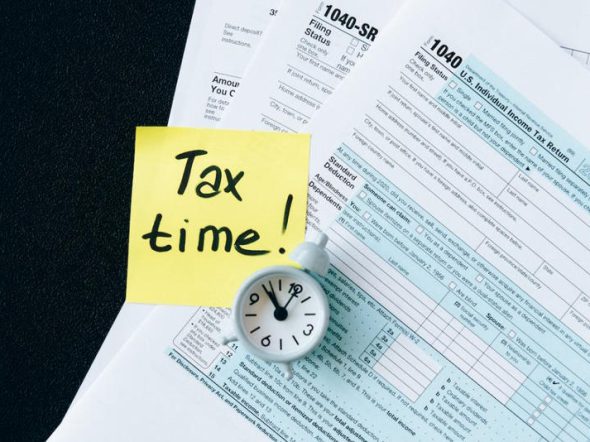Tax season is upon us, and if your income has taken a hit due to the pandemic or other financial hardships, you may be concerned about securing the refund you need to pay off debts and cover expenses. Luckily, there are options available that can help secure an optimal refund—income tax loans. These loans provide access to funds before filing taxes without surrendering any portion of the return.
In this guide, we'll look in-depth at how these loans work to strategically maximize your returns and savings during this challenging period.
What are Income Tax Loans, and How Do They Work
Income tax loans are short-term loans that allow individuals to borrow money against their expected tax refund. Tax preparation companies or financial institutions typically offer these loans. They can be a valuable option for those needing cash immediately but still waiting for their tax refund.
The loan amount is based on the expected amount of the individual's tax refund, and once the refund is received, it is used to repay the loan. It is important to note that income tax loans often come with high-interest rates and fees, and individuals should carefully consider if they are the best option for their financial situation before taking one out.
Benefits of Taking Out an Income Tax Loan
Although income tax loans come with high-interest rates, they may be a good option for individuals requiring immediate funds access. The main benefit of an income tax loan is that it provides you with the money you need immediately and without having to surrender any portion of your return. It means you won't have to give up any of your refund money before receiving it.
In addition, depending on the lender, some income tax loans offer additional benefits such as free or discounted tax preparation services and access to financial education resources. These benefits can help make managing your finances easier during this challenging period.

Things to Consider When Taking Out an Income Tax Loan
Before taking out an income tax loan, it is essential to consider if it is the right option for you. As mentioned, these loans come with high-interest rates and fees, so ensure you understand the terms and conditions before agreeing to any loan. It is also important to remember that taking out a loan against your taxes means you will have less money in your return.
When considering an income tax loan, make sure that you calculate how much of your refund will go toward repaying the loan. Also, be aware of any applicable penalties or late payment charges associated with the loan. Lastly, always shop for the best deals and compare lenders to find one with reasonable interest rates and fees.
Determining Eligibility for an Income Tax Loan
Income tax loans are typically available to individuals with a steady income who can demonstrate their eligibility through documents such as pay stubs or bank statements. However, it is essential to note that not all lenders will offer loans to those with bad credit.
Additionally, some lenders may require applicants to provide proof of insurance or other forms of collateral to secure the loan. Once you have determined your income tax loan eligibility, ensure you understand any additional requirements or restrictions before signing on the dotted line.
Steps to Maximizing Your Refund with an Income Tax Loan
If you decide that an income tax loan is the right option for your financial situation, there are several steps you can take to maximize your refund. First, consider paying off any high-interest debt before taking out a loan against your taxes. It will help ensure you don't become more debt after receiving your refund.
Second, shop around for the best deals and compare lenders to find one with reasonable rates and fees. Lastly, keep track of all your paperwork associated with the loan to avoid any unexpected charges or penalties. Following these steps, you can strategically use income tax loans to maximize your returns and savings during this challenging period.
Tips for Managing Your Income Tax Loan Repayment
Once you have taken out an income tax loan, it is vital to make your payments promptly. Try to set up automatic payments, so your monthly loan payments are automatically deducted from your account. It will help ensure that you get all payments and reduce the potential for late fees or penalties.
In addition, make sure that you monitor your credit score regularly to ensure that the loan is being reported correctly. Lastly, if at any point during repayment, you find yourself struggling financially, contact the lender directly as soon as possible to discuss payment options or alternative solutions. Making these efforts will help ensure a successful repayment of your income tax loan and keep your finances on track.
Common Questions About Income Tax Loans Answered
Income tax loans can be a helpful tool for managing your finances, but as with any loan, potential borrowers may have many questions and concerns. Here are some of the most common questions about income tax loans answered:
Q: Is it challenging to qualify for an income tax loan?
A: In general, qualifying for an income tax loan is relatively simple if you have a steady source of income and can provide evidence of your eligibility. However, not all lenders will offer loans to those with bad credit, so consider this when searching for a lender.
Q: What are the repayment terms on an income tax loan?
A: The repayment terms of an income tax loan will vary by lender, but most lenders will require payments to be made monthly over some time. Additionally, some lenders may charge additional fees or penalties for late or missed payments, so it is essential to read the terms and conditions carefully before signing any loan agreement.
Q: Can I use my income tax refund as collateral?
A: While this may vary from lender to lender, it is not possible to use your income tax refund as collateral for an income tax loan. However, some lenders may require you to provide proof of insurance or other forms of collateral to secure the loan.
By understanding these common questions about income tax loans, borrowers can make informed decisions when choosing the right loan option for their financial needs.
